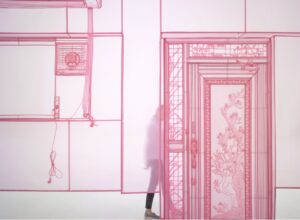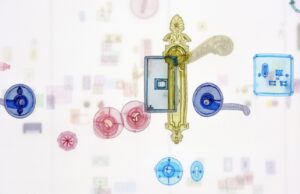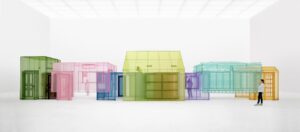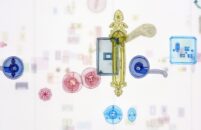
We are all the sum of many influences, our family and friends, genetics, finances, our political, cultural and human rights environments, and our education. Our physical homes also affect our lives. Most of us move house several times in our lives, each time adding some part of the previous dwelling to our DNA. Korean conceptual artist Do Ho Suh explores this in a very literal sense in his latest exhibition, Walk The House, currently on at London’s Tate Modern gallery. His first major show in London for a generation, Do Ho Suh invites us to explore his large-scale installations, videos, sculptures and drawings, prompting us to consider our own personal living spaces, past and present.

Highlights in this show include his fabric architectures – translucent 1:1 scale stretched jewel-coloured polyester gauze replicas of spaces in which the artist has lived and worked. These include the elaborate new installation Nest/s 2024, which weaves together colour-blocked corridors and entryways from four different dwellings, highlighting the porous nature of boundaries traditionally thought of as fixed. Intricate details such as air-conditioning units, window latches and air vents are beautifully sewn together in the same fabric.
Another excellent piece is Perfect Home: London, Horsham, New York, Berlin, Providence, Seoul 2024, an outline of the artist’s present home in London, in the same stretched translucent fabric, filled with beautiful, brightly coloured, precisely-made, architectural features attached to the walls, from his previous homes. These are, again, in the same fabric, including doorknobs, light switches, bathroom fittings and electrical sockets, a fun consideration of the domestic spaces the artist has previously occupied.
Rubbing/Loving Project: Seoul Home 2013-22 highlights the tradition of rubbing practices in Korea, which began
 with the artist covering the entire structure of his actual childhood home in paper, and rubbing the outline onto the off-white paper in grey – a similar process to brass rubbing. The home is reconstructed here in 1:1 scale.
with the artist covering the entire structure of his actual childhood home in paper, and rubbing the outline onto the off-white paper in grey – a similar process to brass rubbing. The home is reconstructed here in 1:1 scale.
My favourite pieces are two of Suh’s video works Robin Hood Gardens 2018 and Dong In Apartments 2022. These explore a cross-section of two derelict council housing estates, floor by floor, horizontally and vertically, one in East London and one in Korea. The videos both feature photogrammetry, a technically detailed process which stitches together images to produce a digital model of the physical world. Through this process Suh strives to explore the built environment as a living organism, a witness to the traces left behind by past inhabitants. The quality of these huge landscape videos in amazing, and they make even the grimmest trash-filled derelict apartments look inviting. We imagine the now-empty dwellings in their previous incarnation, full of energy and life. We lament the potential of the lost living spaces, particularly in the midst of a housing crisis. In his attempt to recreate and remember elements of past and present homes, Suh demonstrates the impossibility of preserving something fully, whether a memory, a place, or a moment in time. Life, however, carries on, but do we need to fully preserve the past? It’s an acceptable loss, and nostalgia is enough. Take time to watch these videos in full.

In a noisy turbulent world Suh’s work consistently offers a gentle respite. His obsessive attention to detail is awe-inspiring, as is his ability to find beauty in the most unlikely objects and surroundings. Suh is very generous in the sharing of his past, in a similar vein to Tracey Emin. It’s an emotional show, but maybe we just need to move on? Lots to consider. An unmissable, thought-provoking masterpiece of a show.





|
Queerguru’s Contributing Editor Ris Fatah is a successful fashion/luxury business consultant (when he can be bothered) who divides and wastes his time between London and Ibiza. He is a lover of all things queer, feminist, and human rights in general. @ris.fatah |

